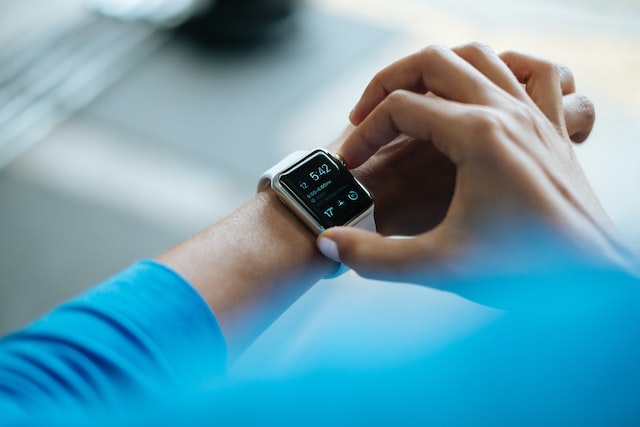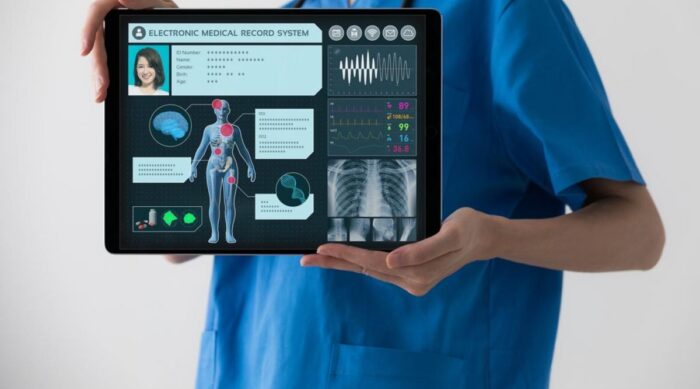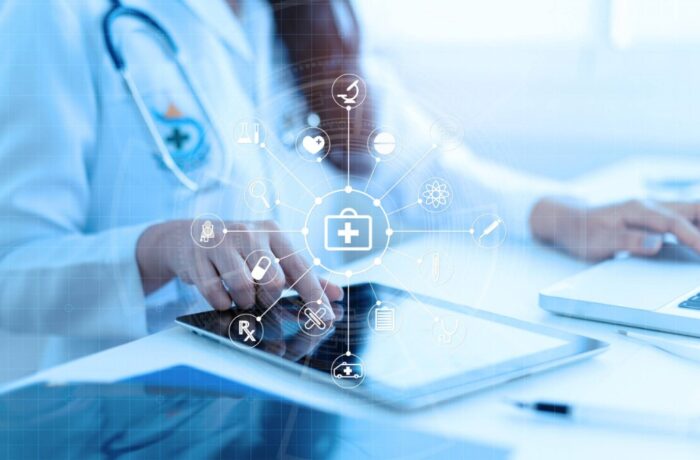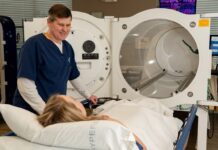
As a result of the COVID-19 pandemic, there have been many changes in the medical sector, which have influenced the rapid development of the Health Tech industry.
Challenges recently faced by medical professionals have proven that institutions receiving patients need drastic improvements, increasing doctors’ efficiency and reducing their response time to a minimum. Some software, thanks to its simplicity and usability, has quickly managed to convince the demanding medical industry, and thus – secure a strong position in the IT market.
Health Tech development
Increasingly, medical institutions are placing emphasis, on fine-tuning software to meet the needs of specific institutions, and on scaling solutions to their needs and requirements. The reliability of the latest technological solutions has greatly increased the health industry’s confidence in Health Tech. Among the most popular software that medical institutions are implementing are:
1. Electronic health records (EHR)

In order to securely store patient data and prevent situations such as data replication or data loss, it is worthwhile to take an interest in electronic health records (EHR), which can be directly integrated with software, to manage a given medical facility.
The EHR provides a modern record of medications, assigned by the doctor, analyzing them in terms of the patient’s health (for example, whether there are no allergies to drug components), as well as simple billing, since the EHR also has its financial module as standard. Electronic medical records support the treatment process by minimizing the risk of errors.
2. Appointment booking software
Software to streamline appointment booking is one of the most popular Health Tech solutions used by health institutions. Thanks to the creation of a panel on the side of the patient, and the medical professional, it is possible to quickly book an appointment. The comfort of this solution associated with the lack of the need to call or stand in line, as well as a clear schedule of available doctors’ appointments, significantly improves the operation of medical institutions and positively affects the relationship with patients.
The software is able to send notifications, and seamlessly cancel or reschedule appointments, which fits perfectly with people’s current lifestyles, which are increasingly flexible and unpredictable.
3. Customer Relationship Management for Healthcare

In order to increase patient satisfaction, from working with health institutions, CRM software has been developed, which focuses its efforts on automating and improving the efficiency of administrative tasks such as bill storage, payment system, and medical history maintenance.
The software summarizes this data and delivers it to the patient, which is extremely convenient for both parties.
4. Remote patient monitoring (RPM)
RPM users most often include the elderly, chronically ill or those who are recovering from surgery. RPM makes it possible to monitor a patient’s health when he or she is outside a medical facility.
It has the ability to check the patient’s heart rate and blood pressure, among other things, and if the patient’s condition deteriorates rapidly, RPM is able to perform remote diagnostics and alert medical services.
5. Telemedicine software

Using a web or mobile browser, telemedicine allows doctors to conduct remote consultations with patients. What’s more, the software has such additional features as e-prescriptions and a billing module, which streamline the entire process and make it extremely easy.
6. Medical diagnostic software
With medical diagnosis software, patients can verify the symptoms they are experiencing with a reliable source, such as the opinion of medical experts, rather than information from the Internet, which can often be highly exaggerated.
The software is divided into AI, which is designed for medical professionals, and an application aimed at patients. The application for patients offers medical questionnaires and chatbots through which they can share their symptoms, while the AI software, which serves doctors, enables analysis and rapid diagnosis of data provided by the patient.
7. Hospital management systems (HMS)

An HMS hospital management system is often integrated with an EHR and is designed to qualitatively maintain control over large amounts of data, and make it easier to work with.
An HMS greatly streamlines processes such as booking appointments, scheduling them, checking room availability, viewing patient insurance, and managing prescriptions or hospital charges. With the HMS, medical institutions can maintain high standards of hospital service, with much less energy input.
First and foremost, the patient
At Applover, we are very interested in the Health Tech industry because it responds to the most fundamental human needs like safety and a sense of trust. We realize that the world is developing very rapidly and that the healthcare industry (which affects us all) faces enormous challenges every day. For this reason, we eagerly support Health Tech’s ideas with our experience in software development. We are always eager to get involved in projects that can change the world for the better.








